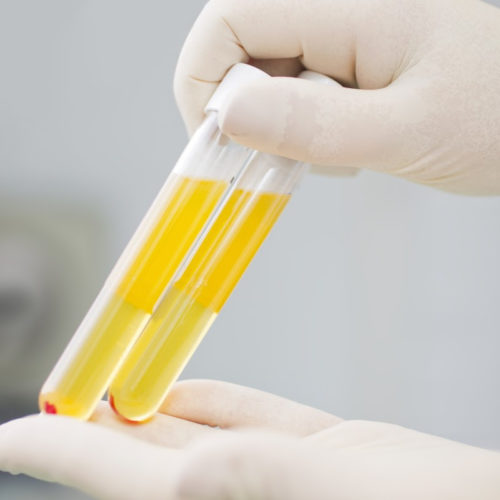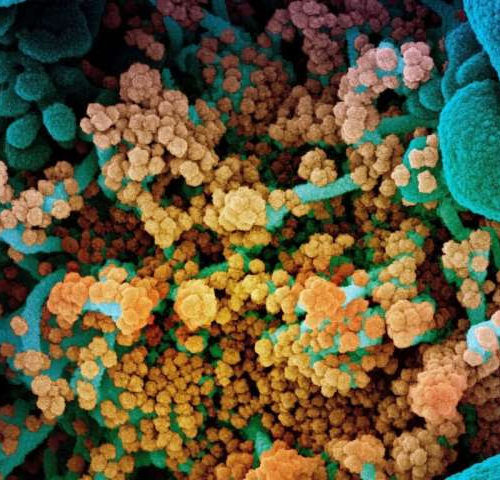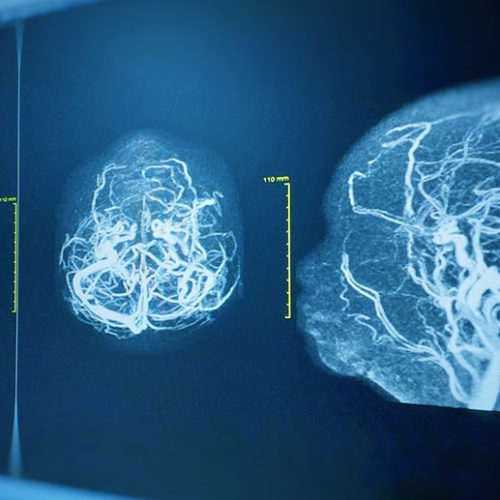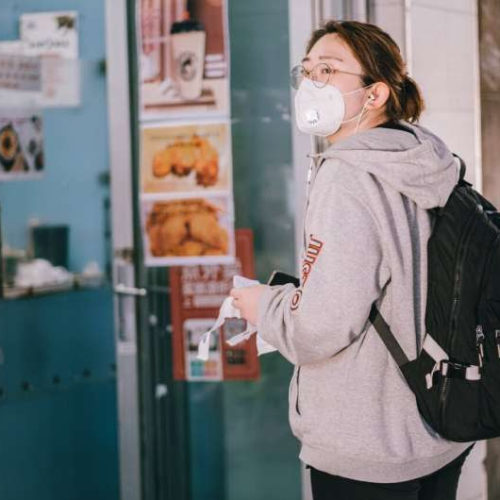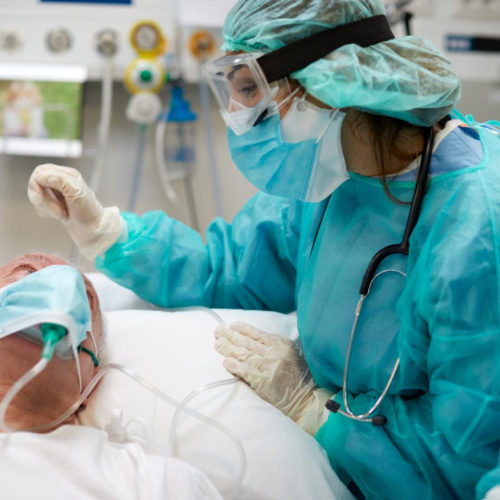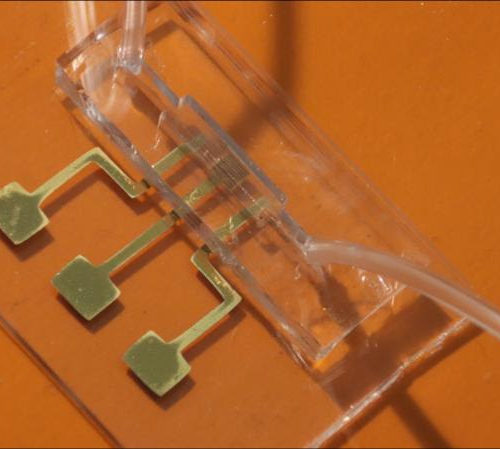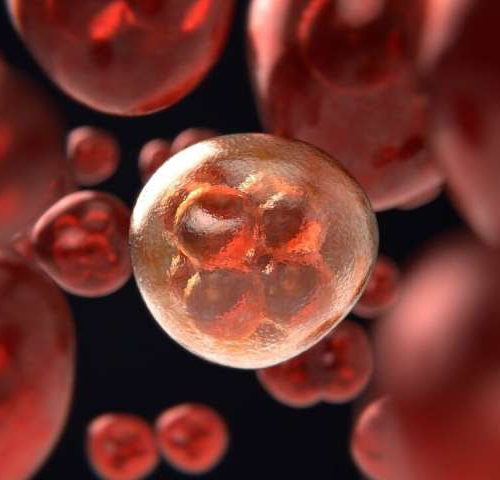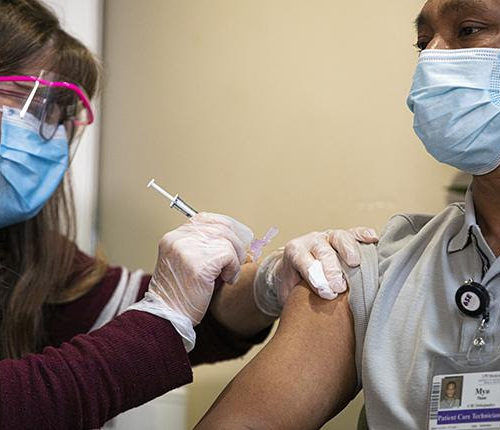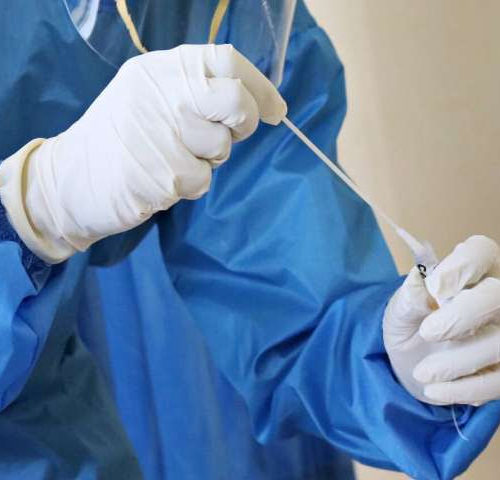THE PHYSIOLOGICAL SOCIETY Making people stand in front of a scanner to have their body temperature read can result in a large number of false negatives, allowing people with Covid-19 to pass through airports and hospitals undetected. Leading experts in physiology have suggested instead that taking temperature readings of a person’s fingertip and eye would...
Tag: <span>COVID-19</span>
COVID-19 blood plasma therapy ineffective in severely ill patients
By Rich Haridy January 12, 2021 Treating current COVID-19 patients with antibody-containing blood plasma from people who have recovered from the disease continues to be studied Flydragonfly/Deposit photos VIEW 1 IMAGES Early findings from a large international clinical trial suggest severely ill COVID-19 patients do not benefit from an experimental therapy involving infusions of blood...
New findings help explain how COVID-19 overpowers the immune system
by University of Southern California Colorized scanning electron micrograph of a dying cell (blue) heavily infected with SARS-CoV-2 (yellow), the virus that causes COVID-19. Credit: NIAID Integrated Research Facility, Fort Detrick, Maryland. Seeking to understand why COVID-19 is able to suppress the body’s immune response, new research from the USC Leonard Davis School of Gerontology suggests that mitochondria are one...
Thinning, Leaky Brain Blood Vessels Seen in COVID-19
by Judy George, Senior Staff Writer, MedPage Microvascular brain injury was seen in COVID-19 patients who died, but no evidence of a direct viral attack on the brain was detected, a pathology report showed. Damage caused by thinning and leaky brain blood vessels consistently appeared on high-resolution MRI, but there were no signs of SARS-CoV-2 infection...
COVID-19 outcomes for patients on immunosuppressive drugs on par with non-immunosuppressed patients
by Johns Hopkins University Bloomberg School of Public Health Credit: Unsplash/CC0 Public Domain People taking immunosuppressive drugs to prevent organ transplant rejection or to treat inflammatory or autoimmune diseases do not fare worse than others on average when they are hospitalized with COVID-19, according to a study from researchers at the Johns Hopkins Bloomberg School of...
Initial severity of COVID-19 not associated with later respiratory complications
AMERICAN THORACIC SOCIETY IMAGE: INITIAL SEVERITY ILLNESS NOT ASSOCIATED WITH COVID-19 COMPLICATIONS POST-RECOVERY. CREDIT: ATS Jan. 8, 2021 – A new study published online in the Annals of the American Thoracic Societyexamines the recovery of lung function and overall wellness in individuals who had varying degrees of COVID-19 severity. Little is known about lung health following...
Detecting COVID-19 antibodies in 10-12 seconds
COLLEGE OF ENGINEERING, CARNEGIE MELLON UNIVERSITY IMAGE: AN IMAGE OF THE COVID-19 TEST CHIP MADE BY AEROSOL JET NANOPARTICLE 3D PRINTING. CREDIT: ADVANCED MANUFACTURING AND MATERIALS LAB, COLLEGE OF ENGINEERING, CARNEGIE MELLON UNIVERSITY PITTSBURGH–Researchers at Carnegie Mellon University report findings on an advanced nanomaterial-based biosensing platform that detects, within seconds, antibodies specific to SARS-CoV-2, the virus...
Immune response to COVID-19 reduced in patients with blood cancers
by The Francis Crick Institute Credit: Pixabay/CC0 Public Domain Patients with blood cancers such as leukemia vary in their immune response to COVID-19 and can struggle to clear infection for very many weeks, according to new research published in Cancer Cell. By contrast, most patients with solid tumors, even those with advanced cancer, can mount an effective and lasting...
Specialists back single-dose vaccine strategy for COVID-19
Giving one dose of the COVID-19 vaccines currently approved in the United States could curtail the spread of the SARS-CoV-19 in the community more quickly than the recommended two doses, say two vaccine experts at the University of Washington School of Medicine. In an editorial published in the Annals of Internal Medicine, Dr. Ruanne Barnabas, associate...
New COVID-19 RNA test gives accurate results within minutes
by University of Birmingham Credit: Unsplash/CC0 Public Domain University of Birmingham researchers have invented a COVID-19 test that reduces testing time from 30 minutes to under five, and delivers accurate results. The method is described in a preprint paper (yet to be peer-reviewed) published on MedRxiv, where the researchers also demonstrate the rapidity and sensitivity of their method using patient...

